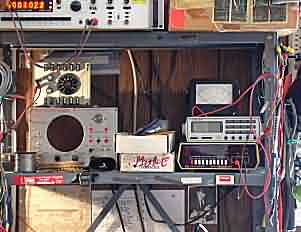 The Bead Masters: The
Wizards of World War
II
The Bead Masters: The
Wizards of World War
II
 The Bead Masters: The
Wizards of World War
II
The Bead Masters: The
Wizards of World War
II
Mon 6/18/2007 2:54 pm. Perusing a 1956 Radio Electronics, as is my wont, I thought of how I was 10 years old then. ... And then, of how the articles were by and about the electronic wizards who returned from World War II, and how their lives were obviously good. ... There were actual ads from IBM and Univac proclaiming you yes you — if you know something or anything about electronics — could be an engineer — or almost, or someday, or something — but they advertised in RE for you....
 ... World
War II saw an unprecedented elaboration of electronic technology, and I
realized one of the treats of the post-war era for the happy technician
was the sloppy victory-at-any-cost circuit design of the
war. ... I believe we will not soon see such a large body of extremely
competent technicians — at least, not without a large war or other
crisis. ... It was undoubtedly highly inefficient to hire some guy who
knew that much to make your television work — but there wasn’t
any
choice, and America had the money! And the desire! ... And the
televisions! ... (And, I should hasten to add, the golden age was doubtlessly
hastened to its conclusion with the aid of the incompetent
technicians, who were also available.)
... World
War II saw an unprecedented elaboration of electronic technology, and I
realized one of the treats of the post-war era for the happy technician
was the sloppy victory-at-any-cost circuit design of the
war. ... I believe we will not soon see such a large body of extremely
competent technicians — at least, not without a large war or other
crisis. ... It was undoubtedly highly inefficient to hire some guy who
knew that much to make your television work — but there wasn’t
any
choice, and America had the money! And the desire! ... And the
televisions! ... (And, I should hasten to add, the golden age was doubtlessly
hastened to its conclusion with the aid of the incompetent
technicians, who were also available.)
... I was particularly impressed by the hi-fi section, with its “Golden Ears” — which in those days meant the small elite who could tell the difference between a table radio and a hi-fi, not today’s pretentious dolts who claim to “hear” speaker cabling. ... The text in endless detail told of amazing beautiful sound — the recordings, and the equipment you — if you were a master technician — could build to hear it. ... In monophonic of course....
... Fast forward to about 20 years ago, when I interviewed somewhere. I had no degree at the time, and the fellow I talked with was an electronic engineer who bitterly resented the idea that I would expect to be hired just because I understood this new-fangled software stuff. ... By those days, the engineers and their cohorts had put the technicians out of business long ago, by rationalizing electronics production so it was all boards and chips and other boring stuff — although of course many of the engineers who did the work were the technicians. ... As in turn I and my cohorts would put the engineers out of business with our devilish software. ... To be turned-out in our turn by — foreigners! ... Who could only possibly provide such a competitive threat in a market of software-based technology. ... I mean, if you have to hire some weirdo to design your software anyway, who in his right mind would hire an American when they can get a cheaper and smarter Asian? ... And they can, because my generation so cleverly designed the internet, where software travels so very easily....
... And I mused, as I read of the obviously fat and happy existence of those 1956 technicians, how my life was one of the vectors of their destruction, how my innocent desire to understand electronic organs, along with the hopes and dreams of thousands of other ten-year olds who grew up to be engineers and programmers and web wranglers, methodically made that amazing post-World War II era of the master technicians only a fading elusive memory....
... “Bead masters” refers to Hermann Hesse’s The Bead Game, a 30s book describing a mysterious intellectual cult of the distant future whose members pursue something like a cross between Bach and chess. ... In my times, many occupations were nominated as the bead players, including mine, the software scriveners. ... But perhaps the post-war technicians came closest....